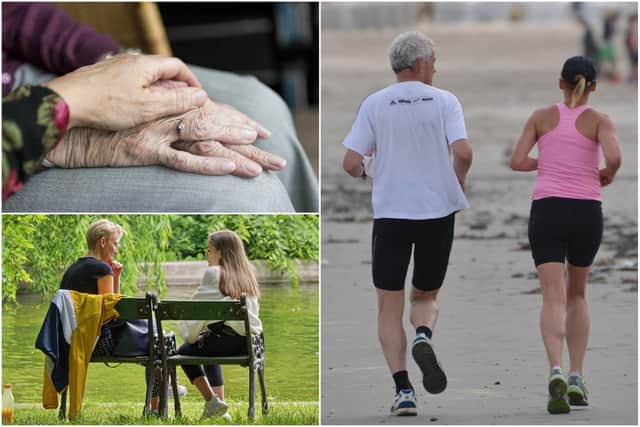Who can you meet and where under the latest lockdown 2 rules
and live on Freeview channel 276
But as the second lockdown is confirmed to start on Thursday, November 5, and will run until Wednesday, December 2, the Government has set out rules about mixing with others.
It wants people to have as little contact with others as possible to reduce the number of coronavirus cases and ultimately, deaths.
Advertisement
Hide AdAdvertisement
Hide AdHere’s what the guidance says about what situations you can see friends and family safely.


The rule about meeting indoors still stands
The Government say: “You must not meet socially indoors with family or friends unless they are part of your household - meaning the people you live with - or support bubble.”
A support bubble is classified where a household with one adult joins with another household.
Households in that support bubble can still visit each other, stay overnight, and visit outdoor public places together.
Advertisement
Hide AdAdvertisement
Hide AdCan you still meet someone outside as you both get some exercise?
The rule does detail that this is possible and states: “You can exercise or visit outdoor public places with the people you live with, your support bubble, or one person from another household.”
It says outdoor public places include:
*parks, beaches, countryside,
*public gardens, whether or not you pay to enter them
*allotments
*playgrounds
Could you meet up for a chat in the garden?
No.
The information is clear and says: “You cannot meet in a private garden.”
Can a parent meet up for a chat with one another?
Details of this have been cleared up in the wake of the announcement after growing confusion from worried parents who had hoped to still meet up outside.
Advertisement
Hide AdAdvertisement
Hide AdConservative MP Alicia Kearns took on the plight of parents, saying she remembered the “loneliness” of being a new mother and called on under ones to be exempt from the rule.
Health minister Nadine Dorries later said said children under school age with their parents will not count towards the limit on two people meeting outside.
Ms Dorries tweeted: “Children under school age who are with their parents will not count towards the limit on two people meeting outside.
“This will mean that a parent can see a friend or family member with their baby or young children.
Advertisement
Hide AdAdvertisement
Hide Ad“Children and adults who are dependent on round-the-clock care, such as those with severe disabilities, will also be included.
“The guidance will be updated to reflect this.”
What about those in need of help?
The Government has said some venues will be allowed to remain open for specific exempt activities, like childcare and support groups.
It says support groups that are essential to deliver in person can continue with up to 15 participants where formally organised to provide mutual aid, therapy or any other form of support.
It adds: “This includes support to victims of crime, people in drug and alcohol recovery, new parents and guardians, people with long-term illnesses, people facing issues relating to their sexuality or gender, and those who have suffered bereavement.”
Advertisement
Hide AdAdvertisement
Hide AdAre weddings, civil partnerships, religious services and funerals allowed to go ahead and how many people can attend?
Funerals can be attended by a maximum of 30 people, and it is advised that only close friends and family go.
Linked ceremonial events such as stone settings and ash scatterings can also continue with up to 15 people in attendance and anyone working at these are not included in the numbers.
It is warned: “Social distancing should be maintained between people who do not live together or share a support bubble.”
Advertisement
Hide AdAdvertisement
Hide AdWeddings, civil partnership ceremonies will not be permitted to take place except in exceptional circumstances.
Will places of worship will be closed?
Yes, unless they are being used for:
*Funerals
*To broadcast acts of worship
*Individual prayer
*Formal childcare or where part of a school
*Essential voluntary and public services, such as blood donation or food banks
*Other exempted activities such as some support groups.